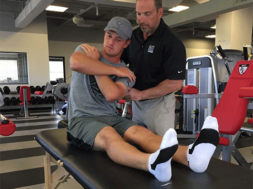
By P. Michael Lanouette, Ph.D., Regional Director of Operations, Centura College/Tidewater Tech/AIM
Highly effective instructors are one of the critical components in creating and maintaining a highly effective school. For this reason alone, it is important to identify these traits when hiring, training, and evaluating, all your instructors.
How do you do that? One way is looking for certain traits found in highly effective instructors.
The traits defined in this article were developed after watching hundreds of instructors across the country and matching them to quantifiable effectiveness (i.e., student satisfaction, student attendance, and student retention).
What makes these traits even more powerful is the reality that instructors with the opposite traits are equally ineffective. This gives education managers a quick and effective tool to gauge the probability of the “real” reason why students drop or are unsatisfied with your school.
The first trait is so easily measured and so easily identified it is amazing how often it is overlooked. The first trait is mobility. Highly effective instructors are up and about. You will never find them in the two worse places of any classroom room, behind the podium or behind the desk. This trait is even more important when it comes to labs. An instructor who sits in the corner with an “I let them do their work and they will come to me when they need help” is not an effective instructor.
The second trait is organized. Highly effective instructors always have a plan and are always prepared. One of the first questions I ask a struggle or weak instructor is “Can I see your lesson plan?” I have had a poor instructor say “Ah, I reviewed chapter three the first hour, gave them a chapter three exam the second hour and started to review chapter four in the last hour.” Safe to say that IS NOT a plan. High effective instructors have a plan that makes sure they never run out of time and certainly never end class early. Finally, these instructors return homework and exams quickly and are never at the copier at 9:05 a.m. when classes start at 9:00 a.m. with a handout they could have copied the day before.
The third trait is patience. High effective instructors always have a calm and cool demeanor. This is not to say they do not get excited about the material they are teaching. This means you will never hear a highly effective instructor raise his or her voice and say things like “What’s wrong with you people?!?” or “We went over this yesterday?!?” or “You should know this already?!?” Highly effective instructors are able to balance their internal frustration of the knowledge that they know the material back and forth after many years of experience with the knowledge that their students are just seeing it for the first or second time. They know the importance and the necessity of slowing down and going over the material again and again and again.
The fourth trait is challenge. This trait was developed when I heard a highly ineffective instructor say one of the worst things an instructor can say. He said, “If they only gave me better students,” followed by “These students are not capable of learning this material.” My response to this pompous non-teacher was quick and just as harsh. “If we only had better instructors,” and “Maybe you aren’t capable of teaching them.”
Highly effective instructors know one of their critical jobs is to take complex topics and ideas and break them down into their smaller and less complex parts.
They know there is nothing that is so complicated that it cannot be broken down into its fundamental learnable sections.
The fifth trait is adjusting. This trait is somewhat the opposite of the last trait. Highly effective instructors have a locked-down plan (see trait two), however, they know that plan will have adjusting “on and off ramps” due to student questions. Some of these questions are topical and allow the class to learn even more about the topic. Some of the questions are silly and have no bearing on the class material. Either way, a highly effective instructor can make adjustments on the fly as naturally as a professional juggler can add or subtract another ball. Highly ineffective instructors will say things like “That is not part of this lesson,” or “You were not paying attention; I answered that questions earlier.”
The sixth trait is the subtlest and covert, but it is also the most real. It is the most real because it is developed by the students. The sixth trait is nickname. Your highly effective instructors most likely have nicknames. Here are just a few I have heard: Mr. Z., Dr. Diesel, Captain. These nicknames were developed because of a connection and respect for the instructor. It is important to note that highly ineffective instructors also have student-developed nicknames: Snapback, Fudd, Six-Pack. These names are usually developed out of a frustration of the class and the instructor’s inability to teach. If you ask around you will find these names quietly echoing through your hallways. If you match the name with the quality of the instructor and response appropriately, great things will happen.
The seventh trait is a tricky one. It is a tricky one because it cannot be taught. The seventh trait is passion. Up to this point, you could set up teaching training on how to be more mobile, organized, patience, etc. I do not think you can teach an instructor to have more passion in the classroom, especially new instructors. The key to this natural trait is it is contagious. If you keep a whiney glum ineffective instructor, it will eventually rub off on your students and the other instructors. It only takes one. However, if you have newer instructors shadow passionate instructors, great things happen. Beware of the topic-passion trap. An ineffective instructor will say, “Some classes and topics are just naturally boring, English, accounting, medical terminology.” When I hear this, my answer is always the same, “It isn’t the topic. It isn’t the class.” Two of the most passionate teachers I have ever seen have taught accounting and medical terminology.
The eighth trait is interaction. Highly effective instructors know they are not teaching a class of 20; they are teaching 20 classes of one. These instructors understand the importance of informal and formal interaction. Informal interaction is as simple as knowing each student’s name as quickly as possible and connecting with each of them informally every class period. This informal interaction can be something as simple as a thumbs-up or a “nice work Jim.” Highly effective instructors also appropriately prepare students for formal interaction, also known as quizzes, exams, and tests. They do not use these formal interactions as a “got ya!” as ineffective instructors will do. They use these formal assessments to manage how they have been teaching. Finally, highly effective instructors do not use this idea of interaction to become pals with their students. They do not hang out in the smoking area with their students or socialize with them.
The ninth trait is serious. Highly effective instructors will have fun and be passionate and get excited about what they teach, but they are grounded in the seriousness of what they teach. They do not teach topics that are antiquated or unimportant. They ground themselves by constantly coming back to the two most important questions in the classroom, “why” and “how.” Highly ineffective instructors often spend the majority of the class period in a painful, almost ancient history lesson, of the material. Highly effective instructors get to the meat of the material by explaining “Why the material is important” and “How to build, repair, calibrate, monitor, …”
The tenth trait, much like the trait of passion, cannot be taught. The tenth trait is caring. The student that has the lowest GPA at your school and does not understand any of the material, knows at least one thing. He or she knows what his or her instructor cares about. They know whether he or she is there to just cash a paycheck or truly cede their knowledge to the student. Highly effective caring instructors are never put off by students who ask if they can stay after class for a few minutes to review the material of the day. They never say, “You will have to schedule a time during my office hours.” They help students who genuinely need and ask for help because they care about something very different than highly ineffective instructors.
Finally, and interesting enough, this trait of caring has absolutely no correlation with how many years an individual has been teaching, how many years an individual has been a professional in the field, or how many letters they have after their name (BS, MS, Ph.D.).
There they are; ten traits you can use to measure your instructors. You can use them in hiring during a mock teaching session. Most of them can be expanded on for individual teaching professional development. You can also use them when evaluation your instructors, including self-evaluation. Incorporating these traits into an instructor-bases improvement and management plan can have great and effective results.
If you are interested in learning more about these traits and how they can be used, feel free to follow the Amazon author page (B00JG7JBDK) or contact Mike at mlanouette@centura.edu.
DR. P. MICHAEL LANOUETTE is the Regional Director of Operations for Centura College, Tidewater Tech, and Aviation Institute of Maintenance – Teterboro. Mike has over 25 years of educational and operations experience in the career college sector. He has served as a Team Leader and two-term Commissioner for ACCSC. He has presented and stirred people up in numerous seminars across the country such as the annual Career College Leadership Training Conference and the International Conference on Retention. In 2010, he was named as one of career colleges’ most influential people and was also named the ACCSC Team Leader of the year in 1999. He holds a Ph.D. and Master’s Degree in Instruction Design from the University of South Alabama and a Bachelor of Science in Oceanography from the Florida Institute of Technology. He has been married for 32 years to his wife Carol and has two daughters.
[/vc_column]
[/vc_row]
Contact Information: P. Michael Lanouette, Ph.D. // Regional Director of Operations // Centura College/Tidewater Tech/AIM // mlanouette@centura.edu










